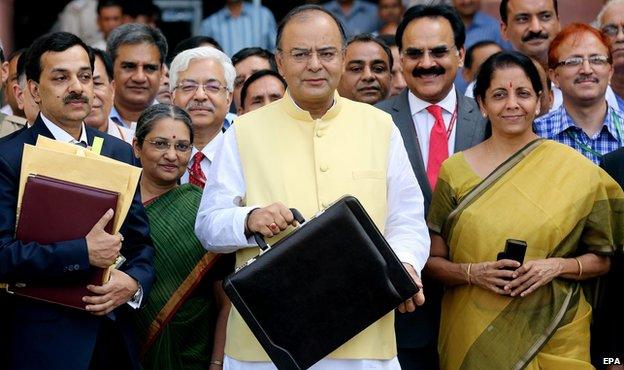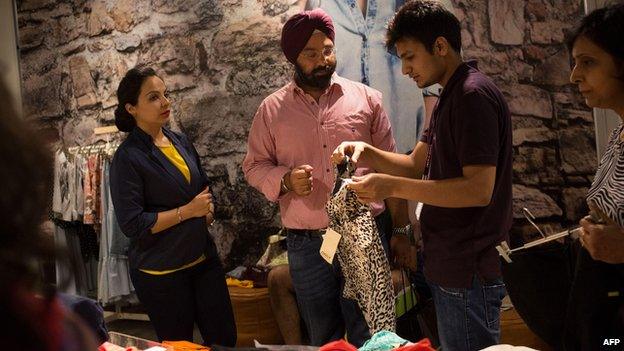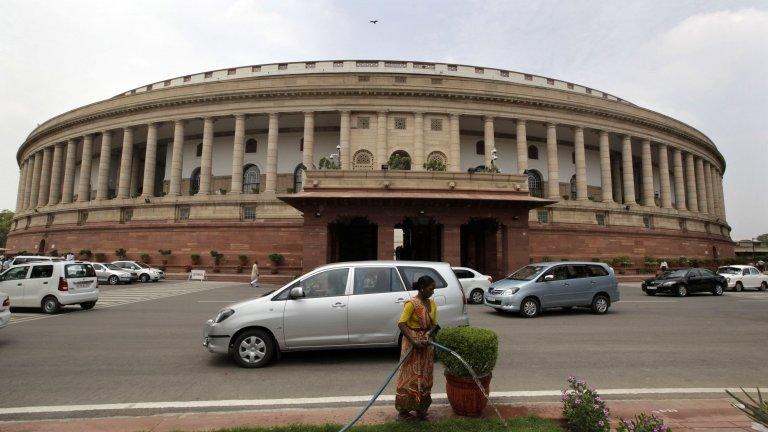India budget: Arun Jaitley unveils reform plans
- Published

Finance Minister Arun Jaitley (centre) promised to strive for a "vibrant and strong India"
India's new government is promising to bring back higher growth, with a budget including more scope for foreign investment, spending on infrastructure and a goods and services tax (GST).
The finance minister also indicated there were plans to limit expensive but popular subsidies on food and fuel.
India's economy has slowed in recent years, growing by 4.7% in 2013-14.
Prime Minister Narendra Modi's BJP swept to power in the recent election on the promise of reviving the economy.
Finance Minister Arun Jaitley said India's people were "exasperated" after two years of economic slowdown.
Mr Jaitley said subsidies - which cost India $40bn (£23bn) every year - would be overhauled to make them "more targeted" but offered no detail.
Ratings agency Moody's said the lack of detail made it "challenging to assess the credit impact" of the budget, but still said it would keep its investment grade rating for India.
A slowdown in the manufacturing sector has also hit the economy. India's fiscal deficit - the difference between the government's earnings and its expenditure - has also caused concern.
"We shall leave no stone unturned in creating a vibrant and strong India," Mr Jaitley told reporters ahead of presenting the budget.
Deficit target
Later, Mr Jaitley told parliament that India's economy would grow at a rate of 7-8% within three to four years.
The government is to raise caps on foreign investment in the defence and insurance sector from 26% to 49%.
India will also set up a committee to review retrospective tax claims, such as the nearly $2.2bn claim against the telecoms firm Vodafone in 2012.
Mr Jaitley set a fiscal deficit target of 4.1% of gross domestic product (GDP) for this year with further cuts in coming years - 3.6% in 2015-16 and 3% in 2016-17.
"We cannot leave behind a legacy of debt for future generations," he said.
Mr Jaitley also spoke about plans to introduce a goods and services tax (GST) this year.
He said the government planned to sell an unspecified amount of shares in debt-laden state-owned banks, which are in need of fresh equity.
In a boost to infrastructure, the government plans to spend $1.13bn (£690m) to build 100 "smart cities" and announce programmes to promote investment in factories, roads and ports.
Apart from allowing foreign investment in defence firms, federal spending on defence has also been boosted by 12% to $38.35bn (£22.4bn) to help modernise India's military and narrow the gap with China.
India has been the world's top buyer of arms for the last three years as it replaces its ageing arsenal with modern weapons.
Investors have welcomed the budget with the Sensex stock index rising 1.6%.

The government says India's economy will expand in the coming years
The BBC's Soutik Biswas in Delhi says the new government has shown its ambition to fix India's precarious finances, tame inflation and usher in growth.
However, it will largely depend on sufficient monsoon rains to spur domestic farm growth, and external factors like the global economy and the price of oil, our correspondent says.
A government survey, published on Wednesday, said the country's fiscal situation was worse than it appeared.
The report forecast GDP growth of between 5.4% and 5.9% in 2014-15, but warned that weak monsoon rains - essential for farming - could affect it.
Mr Modi won a landslide general election victory in May with a pledge to boost growth and create jobs for the one million people who enter India's workforce every month.
- Published10 July 2014
- Published9 July 2014
- Published26 May 2014
- Published7 July 2014
